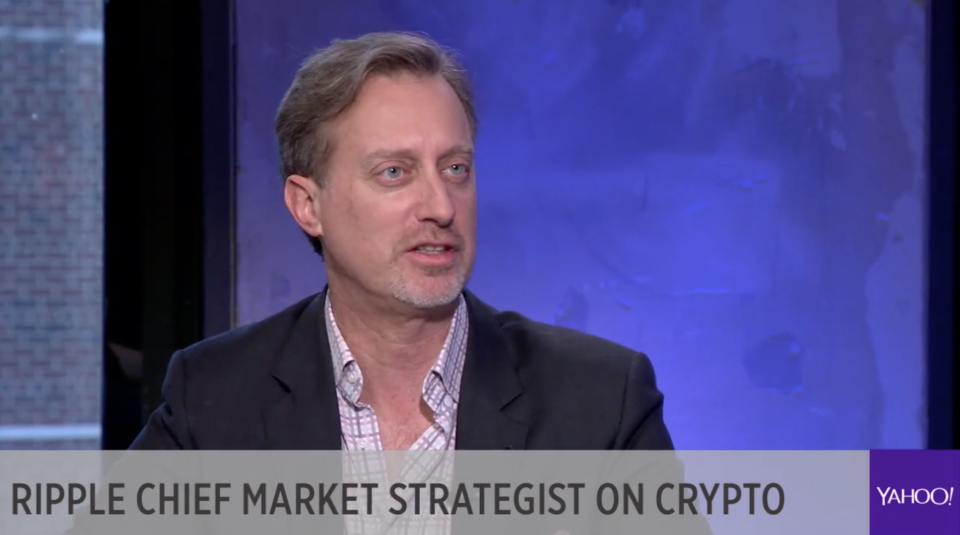Ripple's new chief market strategist: Crypto regulation will 'separate the wheat from the chaff'
Cory Johnson was a founding editor of Slam Magazine, Vibe Magazine, and The Street, and most recently a host on Bloomberg TV—now he’s a cryptocurrency executive. Johnson joined Ripple this month as its first chief market strategist.
For those keeping track, that’s two prominent Bloomberg people to “go crypto” recently: last year Kevin Worth, former CFO of Bloomberg Digital Media, became CEO of the bitcoin news site and live events business CoinDesk.
Ripple is no fledgling crypto startup. The company sells blockchain products to banks that enable faster international payment settlements, and has signed on more than 100 banks as customers. Ripple also uses a digital token, XRP, in one of its products (xRapid) and the price of XRP skyrocketed by 32,377% in 2017. Last month, Western Union announced it would test Ripple’s xRapid product.
But Ripple is also controversial. Because the price of XRP spiked so dramatically at the end of last year, and because the token is only used in one of Ripple’s banking products, there’s confusion in the marketplace about the difference between the company, its products, and its token. Or as CEO Brad Garlinghouse put it at the Yahoo Finance All Markets Summit on cryptocurrency in February, “There’s a lot of FUD” about XRP. (The acronym, common among crypto enthusiasts, stands for “fear, uncertainty, doubt.”)
Cory Johnson says he has long followed the cryptocurrency and blockchain industry from afar, but started to get particularly into it in November, when most of the top digital assets all soared in price.
“From my perspective at the time, which is completely biased now,” he says, “the intrinsic value in these coins, or in these assets, isn’t there. It’s just hoping somebody else is going to find it there… But what I saw in Ripple was something different than what I see in some of these other ones, and certainly a lot of these ICOs: that the activities of the software company create value in the asset, an underlying intrinsic value. I believe that Ripple’s going to able to demonstrate an intrinsic value for XRP that some of these sillier coins and assets don’t have and won’t have.”

Johnson’s new role as chief market strategist will no doubt involve telling the Ripple story (and perhaps sharpening its message) to potential clients and investors. Ripple sells technology products to banks, but one of its products utilizes a cryptocurrency (or, depending on your choice of phrase, a digital token)—is Ripple, then, a crypto company?
“I truly think of it as an enterprise software company,” Johnson says. “It’s an enterprise software company trying to solve issues around payments—for banks, and eventually for companies as well. But it also is sitting on an asset: about $61 billion in XRP. So it certainly has both those components. We are trying to use the asset to create an enterprise software business, where we’ll be charging for enterprise software just like any other enterprise software out there, whether it’s Salesforce or Oracle or SAP.” (Johnson declined to say how much XRP the company included in his compensation package, if any.)
Yahoo Finance also asked Johnson for his take on the recent news that both Facebook and Google have banned scammy advertisements for cryptocurrencies and ICOs. Even though he now works for a crypto company, he says his reaction to the news was, “Thank god. So many scams… Regulation is going to be good for the world of blockchain companies and cryptocurrencies, because it really is going to separate the wheat from the chaff. I don’t think we’re there yet, but I think it’s a good thing.”
—
Daniel Roberts covers bitcoin and blockchain at Yahoo Finance. Follow him on Twitter at @readDanwrite.
Read more:
Ripple CEO: ‘There’s a lot of FUD about XRP’
Ripple CEO: ‘Don’t call it cryptocurrency’
Blockchain CEO on ‘Just Hold’ mantra: ‘I don’t believe in that’
